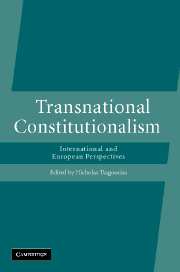Book contents
- Frontmatter
- Contents
- List of contributors
- Foreword by Malcolm D. Evans
- List of abbreviations
- Introduction – Constitutionalism: a theoretical roadmap
- Part I States, courts and constitutional principles
- Part II Transnational constitutional interface
- Part III Visions of international constitutionalism
- Index
Introduction – Constitutionalism: a theoretical roadmap
Published online by Cambridge University Press: 01 July 2009
- Frontmatter
- Contents
- List of contributors
- Foreword by Malcolm D. Evans
- List of abbreviations
- Introduction – Constitutionalism: a theoretical roadmap
- Part I States, courts and constitutional principles
- Part II Transnational constitutional interface
- Part III Visions of international constitutionalism
- Index
Summary
Constitution, constitutionalism, constitutionalisation – these are some of the terms used to describe the political and legal culture, not only within states, but also beyond states. Often these terms take a descriptive and empirical twist; they describe empirically observable events relating to the structure and organisation of political spaces. At other times, they take a normative twist and become prescriptive and axiological. In their latter disguise they refer to the values and principles that an entity possesses or should possess, in addition to any organisational format that it may have. Regardless of what form they may take, we should acknowledge that the term ‘constitutionalism’ and its derivates are pregnant with promises that exert a strong appeal, and place constitutionalism at the apex of political and legal aesthetics or virtues.
It is important, then, to explain the meaning of constitutionalism before we discuss whether it operates in political spaces beyond states and, if it does, what its nature is. Constitutionalism is about the normative and structural premises of political orders; but whereas constitutions utter the forms of organisation of specific political spaces and the normative commitments of the members of that polity, and whereas ‘constitutionalisation’ refers to a constitution-hardening process, constitutionalism is the ideology behind the process of constitutionalisation and the ideology behind constitutions as outcomes. To put it differently, constitutionalism provides the ideological context within which constitutions emerge and constitutionalisation functions.
- Type
- Chapter
- Information
- Transnational ConstitutionalismInternational and European Perspectives, pp. 1 - 14Publisher: Cambridge University PressPrint publication year: 2007
- 3
- Cited by

